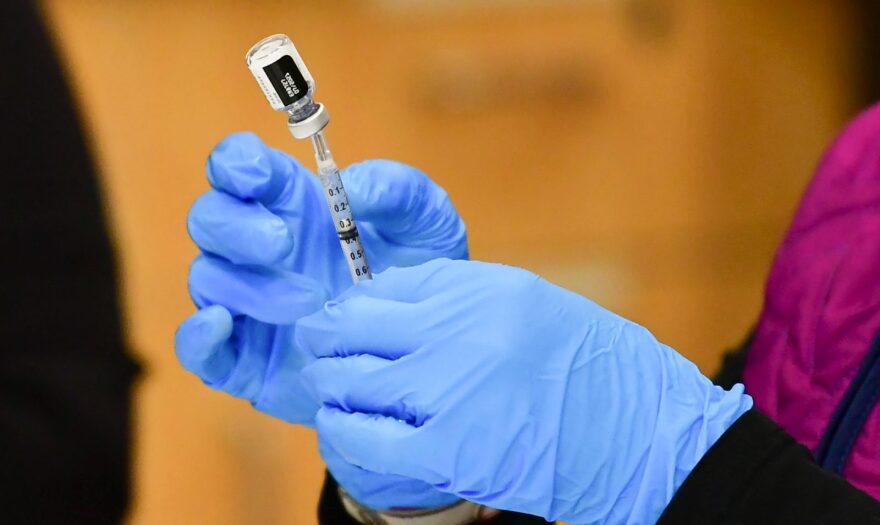Armed with a $10 million budget to pursue lawsuits against the federal government, state Attorney General John O'Connor is seeking an injunction to prevent the U.S. Department of Defense from requiring members of the Oklahoma National Guard to be vaccinated against COVID-19.
TRANSCRIPT
Dick Pryor: This is Capitol Insider, your weekly look inside Oklahoma politics, policy and government. I'm Dick Pryor with eCapitol news director Shawn Ashley. Shawn, the Stitt administration has escalated the battle with the U.S. Department of Defense over vaccination requirements for members of the Oklahoma National Guard. After being rebuffed by the Secretary of Defense, the state Attorney General has filed a lawsuit seeking an injunction against the federal government. Members of the military routinely obey orders and take vaccinations. Why is the Stitt administration going to such lengths to make this particular requirement an issue?
Shawn Ashley: Well, I think it has not so much to do with the particular requirement that National Guard members get vaccinated and really has more to do with the fact that the Biden administration in particular, is requiring the vaccinations. Previously, O'Connor has sued the federal government over a requirement that certain health care workers get the COVID-19 vaccine, and he was successful in that lawsuit, at least temporarily. He's also challenged the Occupational Safety and Health Administration’s authority to require staff at private employers with more than 100 workers to get vaccinated. And in each case, O'Connor, as well as Governor Stitt, claim the federal government was overreaching or exceeding its authority. And that was exactly the purpose of House Bill 1236 that lawmakers approved during the 2021 regular session and Governor Stitt signed. It created the State Reserve Powers Protection Unit at the Attorney General's office and gave it $10 million to fund lawsuits just like these.
Dick Pryor: Lawmakers are getting ready for the 2022 regular legislative session. Are they looking at passing laws regarding vaccinations?
Shawn Ashley: Yes, it appears they are. Five bills have already been filed that deal in some way with vaccine mandates. Most would prohibit them, but some give employees who would be subject to those mandates legal recourse against the company that implements them. One other bill, it should be noted, would eliminate the vaccine and mask mandate prohibitions that lawmakers approved and Governor Stitt signed during the 2021 regular session.
Dick Pryor: The deadline for bill requests is December 10th, and the pre-filing deadline is January 20th. Where does the bill filing process stand now?
Shawn Ashley: Well, those six bills I just mentioned are part of just over 50 that have been filed for the 2022 regular session. Prior to the 2020 Regular Session, lawmakers filed more than 2,200 new measures for consideration. So, it looks like we still have a long way to go. The new bills that are being filed will be added to the more than 2,500 that were carried over from the 2021 Regular Session, so they'll be a lot on lawmakers’ plates when they return in February.
Dick Pryor: Absolutely, and one of the biggest issues every year is the budget. What does the state's economic picture look like now heading toward the 2022 session?
Shawn Ashley: General Revenue Fund collections have pretty consistently exceeded both the estimate and prior year's collections so far this fiscal year. The Office of Management and Enterprise Services will issue its report for November collections later this month, and that will give us an even better idea of where things stand. And that will be one of the last data points, if you will, before the Board of Equalization meets December 27th to consider the preliminary revenue estimate for fiscal year 2023. That's the estimate on which Governor Stitt will base his fourth executive budget.
Dick Pryor: Oklahoma voters will go to the polls in 2022 to elect statewide officials, including governor, as well as members of the Legislature and Congress. Party primary elections will be held in June. Recognized political parties in Oklahoma are required to notify the Secretary of State Election Board whether they will allow registered Independents to vote in their particular party primaries. What have the parties decided?
Shawn Ashley: Well, Republicans did not express a preference, so their primaries will remain closed. Libertarians also decided to keep their primaries closed, but Democrats will again allow Independents to participate in their primaries. So, the 2022-2023 election period will be like that of 2020-2021, with Independents only able to participate in Democratic Party primaries.
Dick Pryor: All right, thanks Shawn.
Shawn Ashley: You're very welcome.
Dick Pryor: And we'd like to hear from you. Email your questions to news@kgou.org or contact us on Twitter @kgounews and @ecapitol. You can also find us online at kgou.org and ecapitol.net. Until next time, with Shawn Ashley, I'm Dick Pryor.





